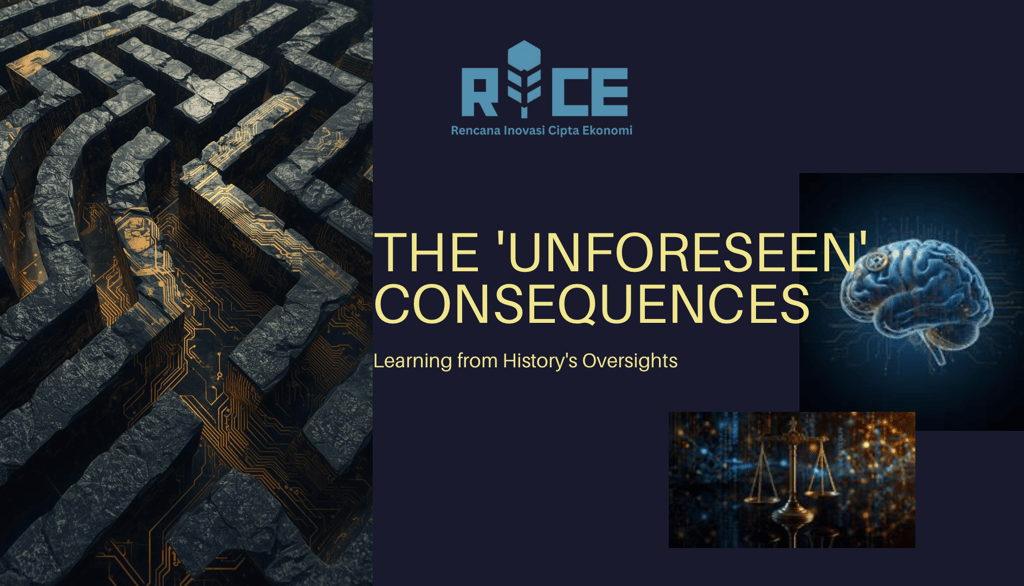The 'Unforeseen' Consequences: How History's Ethical Blind Spots Inform Responsible AI Design
Explore how historical ethical oversights in technology inform responsible AI design.
AI INSIGHT
Rice AI (Ratna)
10/15/20257 min read


Are we truly prepared for the profound ethical challenges that artificial intelligence (AI) systems are increasingly presenting? As AI rapidly integrates into every facet of our lives, from healthcare diagnostics to financial decisions and even autonomous systems, the potential for "unforeseen" consequences grows exponentially. Yet, these consequences are often only unforeseen by those who fail to consult the past.
Responsible AI design is not merely a technical challenge; it is a profound ethical endeavor rooted in historical foresight. By examining humanity's past ethical blind spots—instances where scientific, technological, or policy advancements led to unintended societal harms due to a lack of foresight or critical ethical consideration—we gain invaluable lessons. These historical parallels offer a crucial framework for anticipating and mitigating AI’s potential for negative impact, ensuring that innovation serves humanity responsibly. At Rice AI, we believe that understanding these historical echoes is paramount to building trustworthy and equitable AI systems for the future.
The Imperative of Historical Perspective in AI Ethics
Ignoring history leaves us vulnerable to repeating its mistakes, a risk amplified by the scale and speed of AI deployment. Examining past ethical lapses reveals patterns of oversight, bias, and power imbalances that, if unaddressed, will inevitably manifest in autonomous systems. This historical lens is not about condemnation but about learning to build better, more resilient ethical frameworks.
Medical Ethics: Thalidomide and Tuskegee's Cautionary Tales
Consider the tragic case of Thalidomide in the late 1950s and early 1960s. A seemingly beneficial sedative, it was prescribed to pregnant women without adequate testing on pregnant subjects, leading to severe birth defects worldwide. This was an ethical blind spot born of insufficient foresight regarding drug safety protocols and a failure to consider vulnerable populations.
Similarly, the infamous Tuskegee Syphilis Study, which withheld treatment from African American men to observe the natural progression of the disease for 40 years, showcases a horrifying disregard for human dignity and systemic racial bias in medical research. These events underscore a crucial lesson: scientific advancement, without robust ethical oversight and consideration for diverse populations, can lead to devastating and prolonged suffering. For AI, this translates to the need for thorough, inclusive testing and an unwavering commitment to equitable impact.
Urban Planning: Redlining and Infrastructural Segregation
Beyond medicine, historical urban planning offers stark lessons. Practices like "redlining" in the mid-20th century explicitly denied services and investment to neighborhoods based on race, creating decades of economic and social segregation. These were not overtly malicious AI algorithms, but human-designed policies that encoded systemic bias into the physical and financial infrastructure of cities.
The consequences were enduring: generational wealth disparities, unequal access to education and healthcare, and persistent social injustice. The blind spot here was the failure to recognize how seemingly neutral administrative policies could perpetuate and amplify existing societal inequalities. This historical example directly parallels how biased datasets or unexamined algorithmic criteria in AI can lead to digital redlining, perpetuating social injustices in credit scoring, housing applications, or even predictive policing.
AI's Modern Manifestations of Historical Blind Spots
The historical ethical challenges we’ve discussed—lack of foresight, systemic bias, opacity, and power imbalances—are not distant echoes but direct precursors to the ethical dilemmas we face in AI today. Our advanced technologies can, unfortunately, replicate and even amplify these old prejudices on an unprecedented scale.
Algorithmic Bias: The New Frontier of Old Prejudices
One of the most pressing ethical concerns in AI is algorithmic bias, where AI systems produce unfair or discriminatory outcomes. This bias often stems directly from the data used to train these models. If training data is unrepresentative, incomplete, or reflects historical human prejudices, the AI system will learn and perpetuate these biases. For instance, facial recognition systems have historically struggled with accuracy for individuals with darker skin tones or women, echoing historical biases in data collection and representation.
Similarly, AI-powered hiring algorithms have shown tendencies to favor male candidates or those from specific demographics, simply because the historical data they learned from reflected existing gender and racial disparities in hiring. These are direct manifestations of historical ethical blind spots, where the data, rather than explicit human intent, encodes and scales societal prejudice. Building fair AI requires meticulous data ethics and continuous auditing, a core tenet of our work at Rice AI.
Opacity and Accountability: The Black Box Problem
Many advanced AI models, particularly deep learning networks, operate as "black boxes." Their decision-making processes are so complex that even their designers struggle to fully explain why a particular output was generated. This opacity creates a significant challenge for accountability. If an AI system makes a critical decision—such as denying a loan, flagging a potential criminal, or recommending a medical treatment—and the reasoning cannot be understood, how can we assess its fairness, correctness, or identify where an error occurred?
This lack of transparency echoes historical ethical blind spots where powerful institutions made decisions with opaque processes, leading to unchecked harms and a lack of recourse for those affected. Without the ability to interrogate an AI's rationale, we risk ceding control and responsibility to systems we don't fully comprehend. The push for Explainable AI (XAI) is a direct response to this, aiming to demystify AI decisions and foster trust.
The Societal Impact: Power, Control, and Autonomy
As AI systems become more sophisticated, they begin to wield significant power, influencing everything from individual liberties to geopolitical dynamics. Understanding the historical implications of unchecked power and control is vital for guiding AI’s integration into society. We must proactively establish ethical guardrails that prioritize human autonomy and societal well-being.
Surveillance and Privacy Erosion
History is replete with examples of surveillance being used as a tool for control, oppression, and discrimination. From state surveillance during totalitarian regimes to corporate monitoring practices, the erosion of privacy often precedes the erosion of other civil liberties. AI-powered surveillance technologies—such as sophisticated facial recognition, gait analysis, and predictive behavioral analytics—amplify these historical risks manifold.
These technologies can enable pervasive, real-time monitoring of individuals, raising profound concerns about data privacy, freedom of speech, and the right to assembly. The "unforeseen" consequences here might include the chilling effect on dissent, the profiling of minority groups, or the weaponization of personal data. Ethical AI deployment demands a robust commitment to privacy-preserving AI techniques and stringent regulatory frameworks.
Autonomous Systems and the Dilemma of Control
Perhaps one of the most significant ethical frontiers is the development of autonomous AI systems. From self-driving cars navigating complex urban environments to autonomous weapons systems making life-or-death decisions, AI is increasingly entrusted with critical judgment calls. The historical parallel here is humanity's recurring struggle with technology that operates beyond immediate human oversight or control.
Consider the ethical quandaries posed by historical advancements like nuclear weapons, where the sheer power of the technology demanded unprecedented ethical deliberation and international cooperation. For autonomous AI, the dilemma of control revolves around questions of moral responsibility, error propagation, and the potential for unintended escalations. Who is accountable when an autonomous vehicle causes an accident? What are the implications of delegating ethical decision-making to machines, particularly in high-stakes environments? Maintaining meaningful human control and establishing clear lines of accountability are paramount for ethical AI governance.
Proactive Solutions: Building a Resilient AI Future
The lessons from history's ethical blind spots compel us not merely to react to AI's challenges but to proactively shape its future. Building a resilient, ethically sound AI ecosystem requires a multi-faceted approach, integrating diverse perspectives and continuous commitment to responsible innovation. At Rice AI, we are dedicated to pioneering these solutions.
Interdisciplinary Collaboration and Ethical AI Frameworks
The complexity of AI ethics demands more than just technological expertise; it requires profound interdisciplinary collaboration. We must bring together ethicists, historians, social scientists, legal scholars, and policymakers alongside AI developers. This diverse intellectual tapestry helps anticipate consequences from multiple vantage points, preventing the narrow, siloed thinking that often leads to ethical blind spots. Ethical AI frameworks—principles like fairness, transparency, accountability, human-centricity, and safety—serve as essential guides.
These frameworks provide a common language and a set of standards to ensure that ethical considerations are embedded from the earliest stages of design, throughout development, and into deployment. At Rice AI, we actively champion these principles, integrating them into our methodologies and collaborating with our partners to implement robust, human-centered AI solutions. Our commitment is to foster an environment where ethical considerations are not an afterthought but an intrinsic part of the innovation process.
Continuous Auditing and Public Engagement
The development of AI is not a static process; systems evolve, data changes, and societal values shift. Therefore, ethical vigilance must be continuous. This necessitates rigorous, ongoing auditing of AI systems, both before and after deployment, to monitor for bias, unintended consequences, and adherence to ethical guidelines. These audits should not only assess technical performance but also evaluate societal impact, ensuring that AI systems remain aligned with ethical standards and public welfare.
Equally crucial is broad public engagement. Meaningful dialogue with diverse stakeholders—including affected communities, advocacy groups, and the general public—is essential for shaping AI's ethical trajectory. Public input helps identify potential harms that experts might overlook and ensures that AI development reflects democratic values and societal priorities. By fostering transparency and inviting feedback, we can collectively steer AI towards a future that benefits everyone, not just a select few.
Conclusion
The journey through history's ethical blind spots reveals a critical truth: the "unforeseen" consequences of powerful innovations are often only unforeseen by those who fail to examine the past with diligence and empathy. From medical tragedies born of inadequate foresight to systemic injustices embedded by biased policies, history offers a sobering yet invaluable guide for navigating the complexities of artificial intelligence.
We stand at a pivotal moment, with AI poised to reshape our world. The responsibility to design these systems ethically—to anticipate their impact, mitigate biases, ensure transparency, and safeguard human autonomy—rests firmly with us. This is not merely an academic exercise; it is an urgent imperative to ensure that AI serves as a force for good, fostering a more equitable and prosperous future for all.
At Rice AI, we are committed to being at the forefront of this responsible innovation. We leverage deep ethical understanding and cutting-edge technological expertise to help organizations develop, deploy, and govern AI solutions that are not only powerful and efficient but also inherently trustworthy, fair, and aligned with human values. Our approach is informed by these historical lessons, ensuring that your AI initiatives are built on a foundation of foresight, integrity, and ethical excellence.
Ready to ensure your AI initiatives are built on a foundation of ethical foresight and responsible innovation? Connect with Rice AI today to explore how our expertise can guide your journey towards impactful and trustworthy AI solutions. Let's build a future where AI serves humanity without repeating the mistakes of the past.
#ResponsibleAI #AIEthics #EthicalAI #AIDesign #AlgorithmicBias #AIgovernance #FutureOfAI #TechEthics #Innovation #MachineLearning #DataEthics #ExplainableAI #AIaccountability #DigitalTransformation #RiceAI
RICE AI Consultant
To be the most trusted partner in digital transformation and AI innovation, helping organizations grow sustainably and create a better future.
Connect with us
Email: consultant@riceai.net
+62 822-2154-2090 (Marketing)
© 2025. All rights reserved.


+62 851-1748-1134 (Office)
IG: @riceai.consultant
